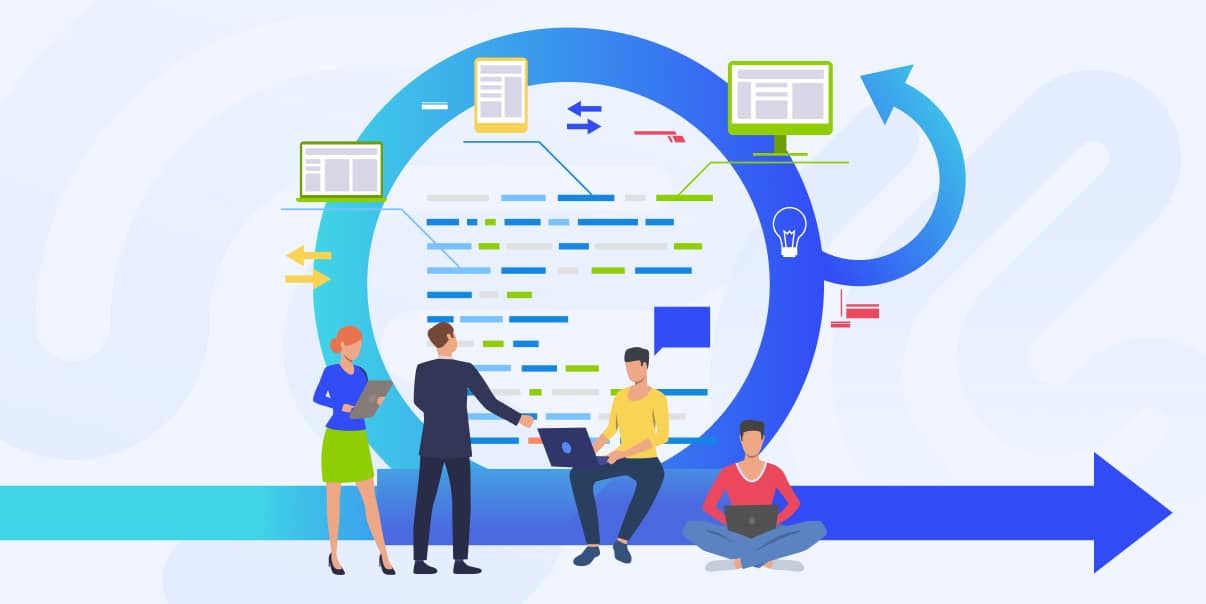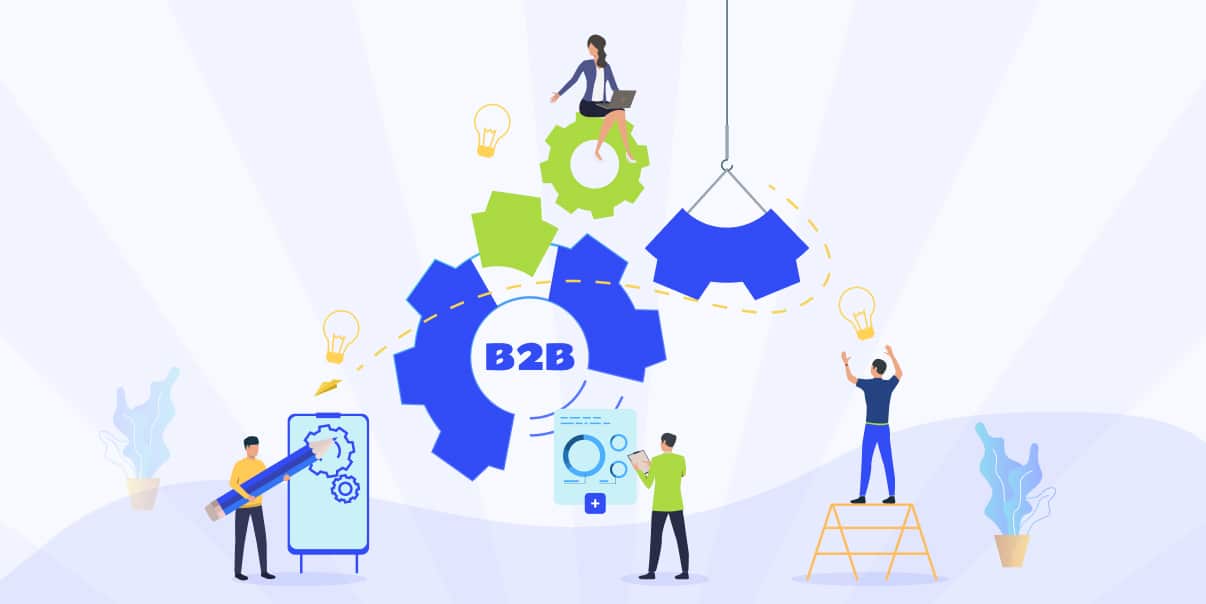Developing Enterprise Applications: Modern Business Needs and Best Practices

Enterprise applications are software programs that help businesses manage their operations. These programs can help organize tasks, manage workflows, and coordinate your teams.
The global market for enterprise apps continues to grow, so having a reliable app is more important than ever. But creating these programs can take a lot of time and effort. If not done carefully, you could end up wasting valuable resources.
This article will cover the best practices and considerations for developing enterprise applications. We’ll discuss why they’re essential and how you can create these apps.
Benefits of Enterprise Application Development
Enterprise application development provides several benefits to businesses. Here are some of them:
Improved Business Processes
Enterprise application development can improve your business processes in several ways. These benefits include:
- Integration. You can integrate your enterprise app with other business systems to better understand how everything is going.
- Standardization. Enterprise application development can make sure everyone in the organization follows the same rules. It makes knowledge transfer smoother and helps reduce mistakes.
- Scalability. The enterprise app can grow as the business grows. It means the app can handle an increase in users without significant changes.
- Mobility. Your developers can design your enterprise app to work on different devices. It will help your employees access your company system from anywhere. It also makes your processes more flexible.
Increased Efficiency and Productivity
Having an enterprise application means your business can do more with less. It will improve your team’s efficiency and productivity in several ways.
Enterprise apps can help you automate manual tasks, like data entry or customer service. It will free up your team’s valuable time so they can focus on other business areas.
Moreover, business apps can provide real-time updates for your business. It means everyone stays on the same page and can collaborate better.
Better Data Management
An enterprise app will help you better store, manage, and analyze company data. It can be a great benefit for businesses that deal with large amounts of data. It helps keep your data secure from cyber threats and internal risks. You can also use access control to decide who can use the data.
Moreover, enterprise applications help you process and analyze data faster and more accurately.
You can use this data analysis to make better decisions for your business. This way, you’ll better understand where to invest resources or how to improve processes.
Enhanced Customer Experience
Having an enterprise application also helps you improve customer service. You can use it to track customer interactions and get insights into their preferences and needs. This app will help you provide a better experience for your customers.
Types of Enterprise Software
Every business is different, so the enterprise software they need is unique. You must choose the right app that will answer your company’s requirements.
Let’s take a look at the types of enterprise software:
Enterprise Resource Planning (ERP) Solutions
Enterprise resource planning (ERP) solutions help businesses run smoothly. They put all the vital information about a company’s operations in one place so everyone can see it. ERP helps an enterprise to work better and faster.
ERP software has different parts called modules which manage other aspects of the business. For example, there is a module for accounting and another for human resource management. You can also add modules for inventory management.
These modules all work together to give real-time information and show how everything is going. This way, businesses can make intelligent decisions and change things quickly.
Examples of ERP solutions:
- Microsoft Dynamics
- Oracle NetSuite
- SAP S/4HANA
Customer Relationship Management (CRM) Systems
If you need help connecting with your customers, having customer relationship management (CRM) systems is ideal. They can help your business track customer data, communication history, and interactions.
The CRM system also helps you manage sales activities. It can show you which customers are most likely to buy and what marketing strategies work best for them.
Examples of CRM Systems:
- Salesforce
- HubSpot
- Zoho CRM
Supply Chain Management (SCM) Systems
Supply chain management (SCM) systems are software that helps businesses manage the flow of their goods. This system can track components, materials, and supplies for your operations.
SCM systems also help you plan and optimize the production process. They help businesses anticipate any disruptions in the supply chain. These systems can also help you change to a different supplier or route if you need to.
Examples of SCM Systems:
- Oracle Supply Chain Management
- JDA Software
- SAP Logistics
Human Capital Management (HCM) Systems
You need human capital management (HCM) systems to manage your human resources. This software includes features like time tracking, payroll, employee benefits, and talent management.
The HCM system also helps businesses track job postings, recruit candidates, and onboard and train new employees. It also makes sure everyone receives the benefits they’re entitled to.
Examples of HCM Systems:
- PeopleSoft
- Workday
- UltiPro
Business Intelligence (BI) and Analytics Platforms
Business intelligence (BI) and analytics platforms help businesses make data-driven decisions. They provide various tools to visualize, analyze, and interpret data.
BI platforms can also help businesses understand customer behavior and industry trends. This way, they can make smarter decisions about their investments and marketing campaigns.
Examples of BI and Analytics platforms:
- Tableau
- SAP BusinessObjects
- Power BI
Enterprise Content Management (ECM) Systems
Finally, Enterprise content management (ECM) systems help businesses store and manage content. They include text documents, spreadsheets, videos, photos, and other digital assets. ECM systems make sure that your company information is secure and organized.
They also make it easier for teams to collaborate on projects. You can store all the data in one place and ensure everyone has access to the latest version of a document.
Examples of ECM Systems:
Enterprise Application Development Process
Now, let’s look at the enterprise application development process. This multi-step process helps you build an app that meets your business needs.
Planning and Analysis
The first step is to do some research and plan out the purpose of your enterprise application. You must decide what features it should have and if it will integrate with other systems. You also need to consider who your users are and what type of devices they’ll be using.
Aside from that, you have to consider using agile development methodologies. This method can help you quickly create an MVP (minimum viable product) and get user feedback. This way, you can make improvements as you. The development process can also be more reliable and faster.
Design and Development
After you’ve decided on the purpose of the application, you can start designing and developing it. This step involves writing code, testing prototypes, and making sure everything works as it should. You must ensure your design is easy and secure for your users.
Testing and Quality Assurance
Once you’re happy with the design, the next step is to test it and solve any bugs or glitches. This process involves running tests on different devices and ensuring the app’s performance meets your standards.
Deployment and Maintenance
After testing and approving the enterprise apps, you can deploy them on different platforms. In this step, you must ensure everything works correctly on other devices. You also need to make sure there are regular updates so the app stays secure and up-to-date.
Custom Enterprise App Development
Custom enterprise app development helps companies create software that answers their specific needs. Developing custom apps may take more time and money than getting pre-made apps, but it is worth it.
Now, let’s discuss how custom enterprise apps can benefit your business.
Benefits of Custom Enterprise App Development
Custom enterprise application development provides more benefits than pre-made solutions. Here are some of the advantages:
- User-Centered Design. With custom apps, you can create an interface that best suits your users and their needs. You can ensure it is easy to use and navigate by designing a user-friendly experience.
- Flexible and Scalable Solutions. Custom enterprise apps can grow with your business. It means you won’t have to switch to a different platform if the number of users increases or if your needs change.
- Better Security Measures. Adding custom security measures and encryption keys can ensure the app is secure. This way, you can ensure that your data and information are safe.
- Cost Savings. Custom enterprise apps can help you save money by automating processes and increasing efficiency. It takes time to develop custom apps, but they usually cost less than pre-made solutions. They require fewer updates and maintenance than pre-made apps.
Importance of User-Centered Design
One of the perks of custom enterprise application development is its user-centered design. But why is it important to focus on the user experience?
When you design your enterprise application to users’ needs, they can use it more efficiently. A great design can help them do their job better and saves time for everyone. Moreover, it helps them learn your new system quickly.
Critical Considerations for Custom Enterprise Application Development
When you’re getting custom enterprise application development, there are a few things to consider:
- Functionality. Ensure the app has all the features your team needs to do their job better. You don’t want an app that is too complex or missing essential elements.
- Testing and Quality Assurance. As we mentioned earlier, testing and quality assurance are essential steps. Ensure your team is running tests to ensure app performance before releasing the app.
- Security Measures. Don’t forget to add security measures like encryption keys and passwords to keep your data safe from threats. They are essential to protect sensitive information like financial records or customer data.
- User Experience. Make sure the user experience is smooth and enjoyable. This way, your team can learn the system quickly and use it effectively.
Enterprise Mobile App Development
It is also essential to make your enterprise apps mobile-friendly. To do this, you must ensure the app works on different devices. Mobile apps will make your processes more flexible and efficient, so it’s worth investing in them.
Moreover, mobile enterprise apps can help you reach a wider audience and improve customer service. You can use them to track customer interactions and send updates. These mobile apps can also help you provide personalized experiences to users.
Key Considerations for Enterprise Mobile App Development
When developing mobile enterprise apps, you need to follow specific considerations. First, you must ensure your app can work across different platforms. You should also optimize it for different screen sizes and devices.
Moreover, ensuring the app is secure from cyber threats and data leaks is crucial. You must also consider how much storage the app needs and if it can work offline. Also, you want your users to have a good app experience. So, you must focus on the design and usability of your app.
Enterprise App Security
Now let’s talk about enterprise app security. This process will help protect your enterprise apps from malware and cyberattacks. It’s important to impose security and protect sensitive data from malicious actors.
Here are some of the reasons why you need enterprise app security:
- Data Protection. Enterprise apps contain a lot of sensitive data. This information includes customer records and financial documents. So, securing your app from malicious actors who can use them to harm your company is essential.
- System Protection. Enterprise apps connect to other systems that store valuable data. If the app is not secured, malicious actors can access and exploit these systems.
- Compliance Maintenance. Different industries have data security regulations that businesses must follow. Having adequate enterprise app security helps you maintain compliance with these regulations.
Common Threats to Enterprise Applications
Now let’s take a look at some of the threats you need to be aware of when it comes to enterprise applications:
- Malware. Malware is malicious software that can infect your system and cause harm. People usually spread malware through links or downloads. So, make sure to always check the source before clicking on anything.
- Data Theft. Data theft happens when someone gains access to confidential information and uses it for unfair gains. It can damage a business, so ensure your enterprise app is secure from data thieves.
- Phishing Attacks. Phishing attacks involve malicious actors pretending to be someone else to get sensitive data. People usually do this through emails or websites that look legitimate. But they contain malware or links to malicious sites.
Best Practices for Enterprise App Security
Here are some of the best practices you can use to secure your enterprise applications:
- Encryption. Encryption helps make your data unreadable unless someone has a key to decode it. Ensure you use encryption for all the confidential data stored in your enterprise app.
- Secure Access. Make sure only authorized users have access to the enterprise application. You can do this by using strong passwords and two-factor authentication.
- Regular Updates. Keep your enterprise app up-to-date with any security patches or updates. This way, you can ensure it’s always secure and compliant with regulations.
- Secure Network. Make sure the network your enterprise app is running on is secure. It means securing your app from threats or malicious actors.
- Coding Practices. Ensure your enterprise app’s developers follow secure coding practices when developing it. These protocols will help ensure the code is safe and secure from threats.
- Security Testing. Finally, always run security tests on your enterprise app to ensure it’s safe and secure. These tests are essential before releasing the app to users.
Enterprise Application Integration
App integration is connecting enterprise applications to work together and share data. It helps businesses streamline processes and make them more efficient.
To explain it, imagine you have two apps – one for billing and one for customer service – that must work together. With integration, you can connect the two apps and ensure they have access to all the information they need.
Enterprise application integration can help your company in several ways. It enables you to save time and money by automating processes. You can also get unified data systems. It can make accessing information from different sources easier.
But, there are some challenges that you may encounter during enterprise app integration.
Common Integration Challenges and Solutions
When integrating enterprise applications, you need to be aware of some challenges. Some of these include:
- Data Integrity Issues. Data integrity issues can arise when you don’t sync different applications correctly. It can lead to consistency in the data and make it easier to access information.
- Security Challenges. Security is always an issue when integrating enterprise applications. It’s essential to ensure your integration system is secure from threats or malicious actors.
- Performance Issues. When you connect too many applications to the integration system, performance issues can arise. These issues can lead to slow response times and low-performance levels.
To solve these challenges, you must have a plan before integrating your enterprise applications. Make sure you test the system thoroughly. You must also follow best practices for security and data integrity. Also, use reliable software integration tools and platforms that can handle your needs.
Future Trends in Enterprise Application Development
Here are some of the future trends to consider in enterprise application development:
AI-Powered Apps
AI-powered apps are becoming more popular as businesses seek to automate their processes. AI can help with data analysis and customer service. It helps companies meet their goals with less effort and overhead costs.
Microservices
In Microservices, you break down app functions into smaller modules. This app makes it easier to update and maintain the system.
Cloud Computing
Cloud computing is becoming more popular in enterprise application development. With cloud computing, you can access data from anywhere. You can also quickly scale up your infrastructure when needed.
AR and VR
Virtual reality (VR) and augmented reality (AR) are becoming popular in enterprise app development. Companies use these technologies can for training, simulation, and customer service.
Mobile Development
Mobile development is also a key trend in enterprise application development. Companies want their apps to work on different devices to reach a wider audience. It can also promote future business growth.
These are just some trends to watch for in enterprise application development. We will see more innovative ways to develop enterprise applications as technology advances.
Conclusion
Enterprise application development is a multi-step process that helps businesses meet their needs. It provides many benefits, like user-centered design and cost savings. It is also a great way to streamline operations and get unified data systems.
But ensuring your enterprise app is secure from cyber threats and data theft is essential. It will also need to be mobile-friendly and optimized for different devices. These features may cost time and money but are worth it in the long run.
If you need help in enterprise application development, BIT Studios can help. Our development company can design, develop, and maintain your enterprise apps. Contact us today and get a free assessment for your app development project.
We’re BIT Studios!
At BIT Studios we specialize in designing, building, shipping, and scaling beautiful, usable products with blazing-fast efficiency



